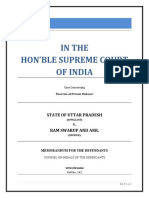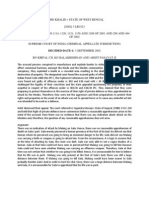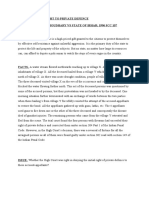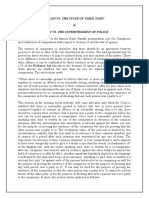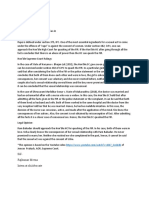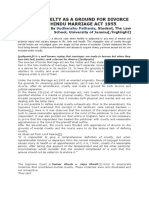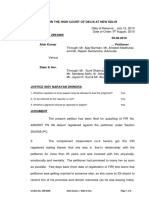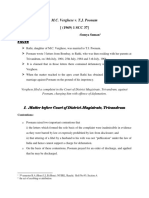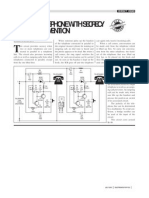Dakhi Singh Vs
Dakhi Singh Vs
Uploaded by
Siddharth TiwariCopyright:
Available Formats
Dakhi Singh Vs
Dakhi Singh Vs
Uploaded by
Siddharth TiwariOriginal Description:
Copyright
Available Formats
Share this document
Did you find this document useful?
Is this content inappropriate?
Copyright:
Available Formats
Dakhi Singh Vs
Dakhi Singh Vs
Uploaded by
Siddharth TiwariCopyright:
Available Formats
1
Dakhi Singh vs. The State (AIR 1955 All 379)
1. This is an appeal by Dukhi Singh who has been convicted by the learned Temporary Civil and Sessions
Judge of Allahabad under Section 302, I. P. C. and has been sentenced to death. Along with the appeal
there is the usual reference by the learned I Temporary Civil and Sessions Judge for the confirmation of
the sentence of death.
2. On the night between the 28th and 29th of July, 1953, a mixed train, designated as Up Train No. 375,
while going from Banaras Cantt. Station to Allahabad, stopped at Handia Khas railway station at 10.59
p.m. On that train there was the Railway Protection Police consisting of Kashi Singh Havildar Guard and
three constables, Chingan Ram, Deomani Singh and Dukhi Singh, the appellant. Deomani got down at
Katka station for taking water and he had left his rifle together with the cartridges in the compartment
which was meant for the R. P. P. The train left Katka station and Deomani could not catch it, with the
result that he was left behind there.
3. At Handia Khas Station Dukhi Singh noticed that a person by name Nanka, who was the servant of
Karamat thekedar, was standing near a goods wagon under suspicious circumstances. Karamat thekedar
held a contract for the collection of burning cinders, which he was to remove through the aid of his men
from the railway track so that the sleepers on the railway track may not get burnt. There existed previous
complaints of theft at Handia Khas station and there was information at the Thana that sugar bags were
being tampered with from time to time at that station and in that connection one of the railway empoyees
had been suspended. It was in that background that Dukhi Singh the appellant thought that the man whom
he had found near the goods wagon was a thief. He arrested him and he took him to his compartment. In
that process Rawil, the engine driver, and one fireman Ram Manohar pleaded before him that the man
was not a thief but was the agent of the thekedar and he should be let off. Dukhi Singh, however, did not
agree and he took him to his compartment.
The train started from Handia Khas station at 12 minutes past 11 in the night and when it had moved a
few steps the arrested man jumped down from the train from its off side, namely, the left side. As soon
as he escaped Dukhi Singh followed him with the rifle. Kashi Singh, the Havildar Guard, fired a shot
from a very-light Pistol which he had with him. It produced temporarily a flood of light. Dukhi Singh
chased the man. The man came from the front of the engine to the right side of the train. It was alleged
that Dukhi Singh also came from the same direction and demanded as to where was the driver who had
concealed the thief and he further held out that he would shoot him. Ram Manohar fireman got down
from the train and was standing near the footboard of the engine. He is said to have asked Dukhi Singh
as to why he would shoot the driver. It was contended that thereupon the appellant shot Ram Manohar
with his rifle and Ram Manohar fell by the side of the foot-board wounded. It was further alleged that
Dukhi Singh aimed the rifle at the driver and the other fireman, but meanwhile Havildar Kashi Singh
came there, caught hold of the rifle and disarmed him. The Assistant Station Master and the Railway
Guard meanwhile arrived. It was contended that Ram Manohar told the Guard that the R. P. P. constable
had shot him and, on enquiry by the railway guard, the appellant told him that the driver had harboured
the thief and had allowed him to escape and so he shot at Ram Manohar fireman.
… [Dying declaration and the post mortem report were stated]
2
9. The appellant's contention was that he had been given orders by the Havildar to shoot at the thief. That
contention finds some measure of support from the statement of Kashi Singh Havilciar, which was taken
by Thakur Ram Pratap Singh, the S. D. H., Handia, in a magisterial inquiry conducted by him. Kashi
Singh, however, stated in the Court of Sessions that although in the magisterial inquiry he had stated that
he had given orders to shoot, that statement was not a true statement and had been given by him under
entreaties by the appellant. Whether that order had been given by him or not does not assume any great
importance in the case, because in either event the appellant could not have been entitled to shoot dead
the thief or the fireman, In this connection, it would be necessary to refer to Section 46, Criminal P. C.
That section lays down that when a police officer arrests a person and such person forcibly resists the
endeavour to arrest him or attempts to evade the arrest, such police officer may use all means necessary
to effect the arrest; but this does not give a right to cause the death of the person unless he is accused of
an offence punishable with death or transportation for life.
In the present case the man who had been arrested was suspected to be a thief. He could not have been
accused of an offence punishable with death or with transportation for life. Consequently in effecting his
arrest after the escape the police officer had not had the right to cause his death. Reference in this
connection may also be made to Sections 76 and 79 … [Cited the provisions of Secs. 76 & 79] Under
these two sections, it was not open to the appellant to plead justification to the extent that he was entitled
to shoot the person dead, or by reason of a mistake to shoot the fireman dead, mistaking him to be a thief,
… [The statements of witnesses were narrated. Although, there were some inconsistencies in the
statements, the Court concluded as follows:]
13. From a consideration of the totality of. circumstances and the evidence in the case we are inclined to
think that after the arrested man had escaped from the running train the appellant pursued him with a view
to effect his re-arrest and, when he was not in a position to apprehend him, he fired at him and in that
process he hit the deceased fireman.
14. The question then would be what offence is made out. We have given our anxious thought to this
question and we are of opinion that the case would be covered by Exception 3 to Section 300 of the Indian
Penal Code. That Exception provides that culpable homicide is not murder if the offender, being a public
servant, or aiding a public servant acting for the advancement of public justice, exceeds the powers given
to him by law, and causes death by doing an act which he, in good faith, thinks to be lawful and necessary
for the due discharge of his duty as a public servant without ill-will towards the person whose death he
has caused. In the present case there was no ill-will between the appellant and the deceased. The appellant
was a public servant and his object was the advancement of public justice. He no doubt exceeded the
powers given to him by law, and he caused the death of the fireman by doing an act which he, in good
faith, believed to be lawful and necessary for the due discharge of his duty. In such circumstances the
offence that was committed was culpable homicide not amounting to murder punishable under
Section 304, Part II, Penal Code. Our conclusion, therefore, is that the appellant should have been
convicted under Section 304, Part II, instead of under Section 302, I. P. C.
15. For reasons stated above we allow the appeal to this extent that we set aside the conviction and
sentence of the appellant under Section 302 and convict him under Section 304, part II of the Indian Penal
Code and we sentence him to seven years' rigorous imprisonment which we consider adequate in the
circumstances of the case. The reference is rejected.
You might also like
- Essential Soft Skills for Lawyers: What They Are and How to Develop ThemFrom EverandEssential Soft Skills for Lawyers: What They Are and How to Develop ThemNo ratings yet
- Ravinder SinghDocument6 pagesRavinder Singhshivam jainNo ratings yet
- Statement of JurisdictionDocument7 pagesStatement of Jurisdictionsparsh yadav100% (2)
- Business Plan For LaundryDocument9 pagesBusiness Plan For LaundryYuyune MarcelloNo ratings yet
- Basic Principles and Theories of Teaching Learning Social Studies SciencesDocument9 pagesBasic Principles and Theories of Teaching Learning Social Studies SciencesMerry Grace Arevalo Asis100% (2)
- State of UP v. Ram SwarupDocument16 pagesState of UP v. Ram SwarupShadan SyedNo ratings yet
- Case Summary: Virsa Singh V. The State of Punjab: Sparsh SharmaDocument3 pagesCase Summary: Virsa Singh V. The State of Punjab: Sparsh SharmaKumari RimjhimNo ratings yet
- Babui Panmato Kuer Vs Ram Agya SinghDocument6 pagesBabui Panmato Kuer Vs Ram Agya SinghIshikaNo ratings yet
- S. Varadarajan Vs State of MadrasDocument10 pagesS. Varadarajan Vs State of MadrasRia SinghNo ratings yet
- Reg Vs Govinda On 18 July, 1876 PDFDocument3 pagesReg Vs Govinda On 18 July, 1876 PDFSandeep Kumar Verma100% (1)
- 1-Whether All Accused Are Guilty For Committing Rape of Riya? A) The Accused Are Guilty of The OffenceDocument7 pages1-Whether All Accused Are Guilty For Committing Rape of Riya? A) The Accused Are Guilty of The OffenceAnupam pandeyNo ratings yet
- Dudh Nath Pandey v. Union of IndiaDocument13 pagesDudh Nath Pandey v. Union of IndiaKishan Patel100% (1)
- Basdev VS State of Pepsu: Citation:1956 AIR 488, 1956 SCR 363Document10 pagesBasdev VS State of Pepsu: Citation:1956 AIR 488, 1956 SCR 363shivam malikNo ratings yet
- Fifth Execption To MurderDocument16 pagesFifth Execption To Murdershaitan singhNo ratings yet
- Article 20 of The Constitution of IndiaDocument8 pagesArticle 20 of The Constitution of IndiaSheldon DsouzaNo ratings yet
- Legal Lang Sem2 AssignmentDocument7 pagesLegal Lang Sem2 AssignmentHelik SoniNo ratings yet
- Mohd Khalid V State of West BengalDocument1 pageMohd Khalid V State of West Bengalian_ling_250% (2)
- Moor Court Problem-2Document7 pagesMoor Court Problem-2Amyra KhanNo ratings yet
- Moot Problem Vidhitaksh - 2024Document2 pagesMoot Problem Vidhitaksh - 2024sem4bctNo ratings yet
- Mirza Ghani Baig VDocument2 pagesMirza Ghani Baig VrajNo ratings yet
- Nanavati's Case and BD Khunte's CaseDocument14 pagesNanavati's Case and BD Khunte's CaseShubham ShivanshNo ratings yet
- Munish Kakkar VS Nidhi KakkarDocument2 pagesMunish Kakkar VS Nidhi KakkarRamesh Babu TatapudiNo ratings yet
- Moti Singh V State of UPDocument5 pagesMoti Singh V State of UPDeeptimaan Yadav100% (1)
- Final Moot ProblemDocument5 pagesFinal Moot ProblemLatest Laws TeamNo ratings yet
- Family LawDocument21 pagesFamily Lawguru charanNo ratings yet
- Mahavir Choudhary Vs State of BiharDocument3 pagesMahavir Choudhary Vs State of BiharNaman KumarNo ratings yet
- BSA - Examination of WitnessesDocument17 pagesBSA - Examination of WitnessesHitanshi PandyaNo ratings yet
- Kruti Shah Moot Court No 1 Defendant PDF Free RemovedDocument26 pagesKruti Shah Moot Court No 1 Defendant PDF Free RemovedAMAN SINHANo ratings yet
- E.K. Chandrasenan ETC ETC v. State of Kerala, 1955 AIR 1066 SCC (2) 99Document2 pagesE.K. Chandrasenan ETC ETC v. State of Kerala, 1955 AIR 1066 SCC (2) 99khadija khanNo ratings yet
- Nalini Vs State of Tamil NaduDocument2 pagesNalini Vs State of Tamil NaduKishan PatelNo ratings yet
- Sd/-Rajkumar Meena Intern at UbadvocateDocument1 pageSd/-Rajkumar Meena Intern at UbadvocateRajkumarNo ratings yet
- Mahbub Shah Vs EmperorDocument2 pagesMahbub Shah Vs EmperorNaman Kumar100% (1)
- Pakala Narain-DdDocument6 pagesPakala Narain-DdRiya LalNo ratings yet
- Rudrrakshi Pandey (Case Comment Property Law)Document10 pagesRudrrakshi Pandey (Case Comment Property Law)Rudrrakshi PandeyNo ratings yet
- Priyadarshini Mattoo Case 2006Document4 pagesPriyadarshini Mattoo Case 2006FukreyNo ratings yet
- PROPERTY LAW Case ReviewDocument4 pagesPROPERTY LAW Case ReviewAgrawal DeekshaNo ratings yet
- Basdev Vs State of Pepsu Ipc Memo SEM 5Document13 pagesBasdev Vs State of Pepsu Ipc Memo SEM 5ApoorvaChandra100% (1)
- FN Balsara SummaryDocument3 pagesFN Balsara SummarySurya Pratap SinghNo ratings yet
- Mental Cruelty As A Ground For Divorce UDocument8 pagesMental Cruelty As A Ground For Divorce UKapil RawatNo ratings yet
- 5th Year Moot 1 PropsDocument9 pages5th Year Moot 1 PropsSarthak SharmaNo ratings yet
- JC-PRAKRUTI (R) Moot MemorialDocument25 pagesJC-PRAKRUTI (R) Moot MemorialNihas TNo ratings yet
- TPA9Document58 pagesTPA9Dr. Dharmender Patial50% (2)
- IPC - Section 498 A and Arnesh Kumar V State of BiharDocument30 pagesIPC - Section 498 A and Arnesh Kumar V State of BiharDivya Arora100% (1)
- ACCOMPLICEDocument5 pagesACCOMPLICEAbhi TripathiNo ratings yet
- D.P. Choudhary and Ors. V. Kumari ManjulataDocument12 pagesD.P. Choudhary and Ors. V. Kumari ManjulatapiyuNo ratings yet
- Chapter 2 Hindu Joint FamilyDocument21 pagesChapter 2 Hindu Joint FamilySAMBIT KUMAR PATRINo ratings yet
- What Are The General Principles Relating To SearchDocument7 pagesWhat Are The General Principles Relating To Searchketanrana2100% (1)
- Abatement Under Indian Penal CodeDocument11 pagesAbatement Under Indian Penal CodeIMRAN ALAMNo ratings yet
- Company Law Anil K NairDocument154 pagesCompany Law Anil K NairAyush ThumbarathyNo ratings yet
- CT University Appealent PDFDocument26 pagesCT University Appealent PDFPavan KumarNo ratings yet
- Sarla Mudgal, President, Kalyani & Ors. Vs Union of India Case Name - Smt. Sarla Mudgal, President, Kalyani & Ors. Vs Union of IndiaDocument1 pageSarla Mudgal, President, Kalyani & Ors. Vs Union of India Case Name - Smt. Sarla Mudgal, President, Kalyani & Ors. Vs Union of IndiaAdan Hooda0% (1)
- Family LawDocument11 pagesFamily LawVivaswan Shipra DeekshitNo ratings yet
- Case Analysis Writing SampleDocument7 pagesCase Analysis Writing Sampleyadu krishnaNo ratings yet
- Interpretation of Stautes XXDocument20 pagesInterpretation of Stautes XXsaurav prasadNo ratings yet
- Alok Kumar Vs StateDocument8 pagesAlok Kumar Vs StateHarsh SrivastavaNo ratings yet
- Mamta Mam Case StudyDocument6 pagesMamta Mam Case Studysandybhai1No ratings yet
- Case Analysis SaumyaDocument8 pagesCase Analysis SaumyaVishakaRaj100% (1)
- Anant Chintaman Lagu V. State of Bombay AIR 1960 SC 500: A Proposal Made byDocument24 pagesAnant Chintaman Lagu V. State of Bombay AIR 1960 SC 500: A Proposal Made byaditi sharmaNo ratings yet
- Tofan Singh JudgementDocument9 pagesTofan Singh Judgementakira menonNo ratings yet
- Supreme Court Case Analysis-NALSA-V.-Union-of-India-By-Lavina-BhargavaDocument8 pagesSupreme Court Case Analysis-NALSA-V.-Union-of-India-By-Lavina-BhargavaFIZA SHEIKHNo ratings yet
- Reactor InternalsDocument7 pagesReactor InternalsArjed Ali ShaikhNo ratings yet
- Spatial and Temporal DatabaseDocument44 pagesSpatial and Temporal DatabaseSathish KumarNo ratings yet
- Knowledge Management, Diversity, and Professional Hierarchies in LibrariesDocument27 pagesKnowledge Management, Diversity, and Professional Hierarchies in LibrarieslibrarywaalaNo ratings yet
- Sharmistha Roy Chowdhury: SummaryDocument6 pagesSharmistha Roy Chowdhury: SummaryDeepak SimhadriNo ratings yet
- P6. Isomerization ProcessDocument27 pagesP6. Isomerization ProcessChiến PhùngNo ratings yet
- Labor Law Pre Week 2019 1 PDFDocument153 pagesLabor Law Pre Week 2019 1 PDFStephany Polinar100% (1)
- Crouzet Temperaturregler CTD43 CTD46 enDocument3 pagesCrouzet Temperaturregler CTD43 CTD46 enxavierNo ratings yet
- Student Copy - Caps - 20Document7 pagesStudent Copy - Caps - 20Sujal KumarNo ratings yet
- Technical Analysis Wisdom - Nishant AroraDocument19 pagesTechnical Analysis Wisdom - Nishant AroraJAI GOENKA100% (1)
- Substation/Switch Yard: Presented by Ankit Kumar REG - NO-11907132 ROLL - NO-07 Section-K19By Group - 1Document38 pagesSubstation/Switch Yard: Presented by Ankit Kumar REG - NO-11907132 ROLL - NO-07 Section-K19By Group - 1Ankit Kumar100% (1)
- BW - Plan Booklet - VTP Bellissimo - 2022-05-10Document37 pagesBW - Plan Booklet - VTP Bellissimo - 2022-05-10Ninad KhandagaleNo ratings yet
- Webview Flutter - DartDocument13 pagesWebview Flutter - Dartİlter Engin KIZILGÜNNo ratings yet
- MATH1179 Vectors and Matrices Book SolutionDocument4 pagesMATH1179 Vectors and Matrices Book SolutionOviyanNo ratings yet
- Lab # 01 Introduction To Assembly and Assemble: Programming LanguagesDocument4 pagesLab # 01 Introduction To Assembly and Assemble: Programming LanguagessaadatNo ratings yet
- Case 4 PDFDocument11 pagesCase 4 PDFYohanesvery.vernando.RambeNo ratings yet
- Best Practice Guidelines For PV Cost CalculationDocument72 pagesBest Practice Guidelines For PV Cost CalculationDoan Anh Tuan100% (2)
- SJPO Special Round 2011 Sample PDFDocument10 pagesSJPO Special Round 2011 Sample PDFziwei_from_chinaNo ratings yet
- Care and Use Instructions Atlantis T3, dC18, and Hilic Silica Columns-Terkunci PDFDocument10 pagesCare and Use Instructions Atlantis T3, dC18, and Hilic Silica Columns-Terkunci PDFrndncu 2019No ratings yet
- HESPISDocument8 pagesHESPISShivarajkumar JayaprakashNo ratings yet
- Parallel Telephone With Secrecy and Call PreventionDocument1 pageParallel Telephone With Secrecy and Call Preventionganesamoorthy1987No ratings yet
- Piezo: ACOUSTI-PHONIC With Dual Output Jacks For Piezo and Magnetic (Blend)Document1 pagePiezo: ACOUSTI-PHONIC With Dual Output Jacks For Piezo and Magnetic (Blend)Kleber FrançaNo ratings yet
- Performance of Etfs and Index Funds: A Comparative Analysis: Post-Graduate Student Research ProjectDocument18 pagesPerformance of Etfs and Index Funds: A Comparative Analysis: Post-Graduate Student Research ProjectAvneetPalSinghNo ratings yet
- Sample Exam Questions - Part TwoDocument5 pagesSample Exam Questions - Part TwoKaylea NotarthomasNo ratings yet
- Pci Dss v3 2 1 Saq A Compliance StandardsDocument24 pagesPci Dss v3 2 1 Saq A Compliance StandardsRahul SinghNo ratings yet
- Maximum Performance, Minimal Environmental Impact: Trailer Refrigeration Single and Multi TemperatureDocument24 pagesMaximum Performance, Minimal Environmental Impact: Trailer Refrigeration Single and Multi TemperatureESlam Abd ElwakelNo ratings yet
- 2015 SalesCatalog USB v9Document15 pages2015 SalesCatalog USB v9ujxabttrcfykpwpdqjNo ratings yet
- FeliciaWangEvoSampetuaHariandja PDFDocument15 pagesFeliciaWangEvoSampetuaHariandja PDFnovita indrianiNo ratings yet
- Website Scraping With Portia On Linode A Step-By-Step Guide To Persistent Data and File TransferDocument3 pagesWebsite Scraping With Portia On Linode A Step-By-Step Guide To Persistent Data and File Transfer45zmsp6h2gNo ratings yet






